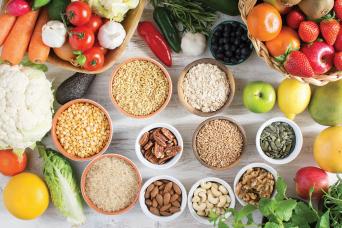
Added Nutrition Makes Sprouting Seeds and Grains Worth the Work

We have lost touch with our ancestral heritage of food preparation. Most traditional cultures naturally soaked and sprouted seeds, nuts, grains and legumes, but this step is rarely taken in large-scale food production, since it is time consuming and affects the bottom line. But it is inexpensive to do at home, and will greatly increase the nutrient content of the seeds, nuts, legumes and grains you consume.
Soaking raw nuts, seeds, legumes and grains (in filtered water overnight, or for at least four hours) releases lectins and enzyme inhibitors, waking them up, releasing vitamins and making grains, beans, nuts and seeds more digestible. All nuts, seeds, legumes and grains have enzyme inhibitors, which are the plant’s natural preservative and self- defense system. These get released when soaked and when the sprouting begins. Soaking and sprouting dramatically reduces, if not completely eradicates, the anti-nutrient content that can impede optimal absorption of vitamins and minerals, especially vitamin B. It also removes phytic acid and reduces tannins.
I like to have pantry-ready staples, so I soak and dehydrate my sproutables as soon as I bring them home. After soaking, I rinse the items thoroughly in a colander. The wet components can be used to make a paté or sprouts, or to preserve the nuts, grains or seeds by dehydrating.
Spread what has been soaked in a thin layer on a baking sheet or on a dehydrator tray lined with a water barrier to dry.
Keep in mind that enzymes lose viability at 118°, so dry your items in a dehydrator if possible, or at the lowest temperature your oven will allow, propping the door open. Many newer models of ranges have a dehydrating setting. The drying step is important to remove the moisture and avoid mold.
Sprouts exceed the nutrient profile present in the mature plant. Vitamin E (which boosts your immune system and protects cells from free radical damage) can be as high as 7.5 milligrams in a cup of broccoli sprouts, compared to 1.5 milligrams in the same amount of raw or cooked broccoli! Sprouts are an excellent source of fiber, manganese, riboflavin and copper, along with smaller amounts of protein, thiamin, niacin, Vitamin B6, pantothenic acid, iron, magnesium, phosphorous and potassium.
There are a variety of accoutrements available to facilitate sprouting, including mason jars fitted with screens, stacking trays with screens, or colanders fitted over a bowl. The most important step is frequent rinsing (at least twice a day), which will manage the growth of bacteria. Allow the sprouts to grow one-eighth to one-quarter inch tails or whatever you like, enjoy them at their enzymatic peak, and let their life force become you.
The Co-op stocks a lovely selection of microgreens, my young greens of choice. Treat yourself to a pack every week and let you and the rest of your household benefit from these 100% bioavailable, life-promoting superfoods. That’s a lot of nutritional bang for your buck! I’m in. You too?
Dorothy Bauer mentored with renowned raw food chef and author Elaina Love. Healthy food and lifestyle are her passions. She focuses in particular on a gluten- and dairy-free, low glycemic diet.
